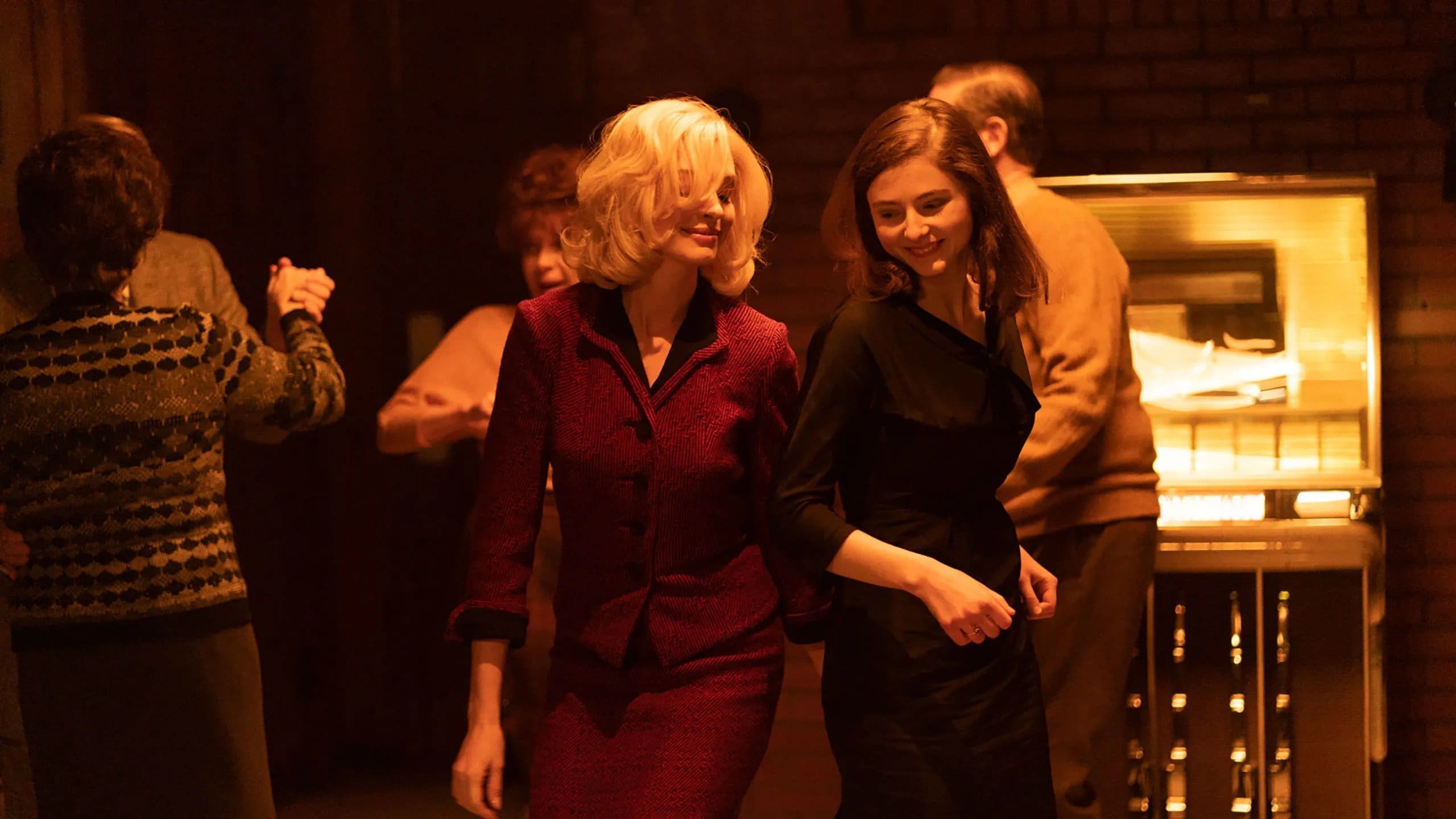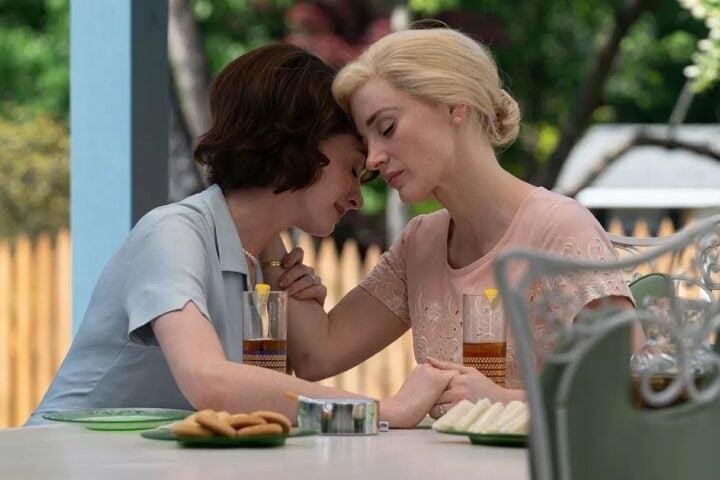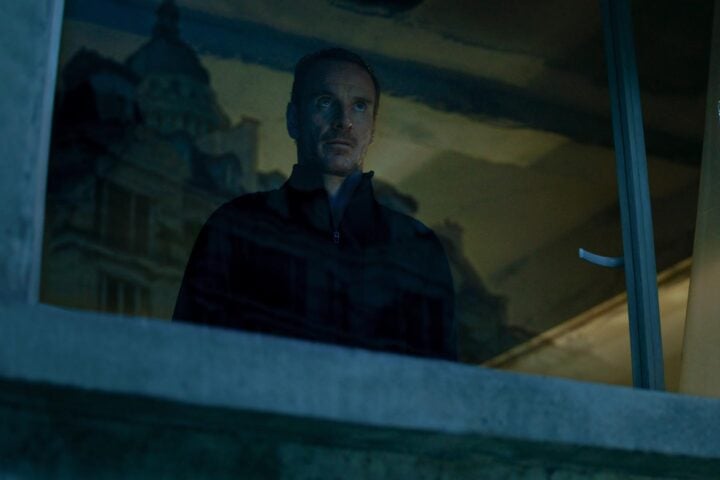Sitting in her shabby car by a foggy waterfront, Eileen Dunlop (Thomasin McKenzie) is waiting for the smoke to envelop her. It gently unfurls through the vehicle, and as she stares out past the grey horizon of the ocean, you sense that she’s used to pondering what it would be like to be swallowed into nothingness. Eileen then turns to look at a couple having sex in a nearby car, and after opening the door to grab a fistful of filthy snow from the ground, she shoves it down her crotch—something cold on something waiting to burn.
It’s an apt metaphor to place at the top of the 1960s-set Eileen, William Oldroyd’s deliciously teasing adaption of Ottessa Moshfegh’s novel of the same name, insofar as the pleasures of this queer noir, which suggests Todd Haynes’s Carol with poison in its veins, are rooted in the ways that it misdirects its erotic energies. While Eileen percolates with lust and fury, something else cold and severe touches the hot surface, letting out what feels like a piercing scream.
Eileen works as a secretary at a Massachusetts boy’s penitentiary. She takes sass from her superiors and, at one point, fantasizes about being aggressively taken from behind by a guard, Randy (Owen Teague). She spends her days going back and forth between the penitentiary, an often deserted beach, and the home that she shares with her alcoholic father, Jim (Shea Whigham). She can do little else but dream of going down alternate paths or wonder what makes the incarcerated boys tick, like the lanky Lee (Sam Nivola). Charged with killing his father—who, like Jim, was also a cop—he looks at and speaks to no one, suggesting a ghost.
The fallout of the American dream, which pervades so many noirs, is Eileen’s starting point, what with the depressive Eileen on the precipice of committing patricide. She’s smart but stifled, unsure of what to do with a jittery intelligence that she’s never had the chance to demonstrate. But that all changes with the arrival of the new prison psychologist, Rebecca (Anne Hathaway). She’s all sophistication, her New Yawk accent sounding like marble in comparison to the brick-hard Boston tones in everyone else’s voices. She even arrives at the prison in a red Thunderbird, gloves the shade of Malbec slipped effortlessly over her hands. Always her platinum blond hair seems too perfectly coiffed, as if she were inviting someone to probe deeper into her head.

Eileen delights in toying with the tropes of noir. Oldroyd has made a film about the chilliness of New England, a state of mind that seeps into and stains your life with its mundanity. Its setting is a dark and ominous place where people are ready to ostracize, where postwar middle-class aspirations are violent and congeal into obsession. That might suggest that Eileen is possessed of a coldness of tone, but central to the film’s effectiveness is how it slowly, steadily, alluringly heats up, drawing the audience into its spell—not unlike the way the camera slowly zooms in on the characters, peeking at them around concrete corners with a paranoid’s eye.
There’s a durational quality to the film’s pulp sensibility, as if one is being forced to feel the minute textures of Eileen’s stagnant life in real time. She’s suppressed her desires for a life of her own in order to take care of the father she hates and who basically hates her. Her imagination of life’s possibilities is trapped, yet eager to be unleashed. She just needs someone with a key. Rebecca, then, would seem to be that person, a sharp-as-knives woman in a hellish place with few allies, and whose glamour disguises the fact that she’s handcuffed by her inability to reconcile her modern approaches to psychiatry at a cruel detention center.
Everything about Hathaway’s performance is done with a little bit of a wink, from the way that she flicks her wrist to the way she lights a cigarette. Throughout the film, the inability to discern to what degree Rebecca’s luring of Eileen is in air quotes—whether she’s actually a friend and savior or something else entirely, a false prophet—is half the fun of Eileen, which feels transmitted from this tense border zone between hot and cold, push and pull, night and day.
Oldroyd prods us by giving Eileen a tantalizing awareness of the woman she wants to be, not only in the form of Rebecca as foil or mirror, but also in the specter of her late mother, whose clothes she wears. Eileen is a shadow of the illusion that Rebecca presents in her icicle-sharp outfits; while Rebecca suggests that she’s jumped off the jacket of a trade paperback, Eileen can only fantasize about doing the same, bristling at the edge of every frame, ignited by her precarious desire for Rebecca. What the film becomes, then, is a pulpy phantasmagoria of fear and desire, offering visions of queer ecstasy within the confines of multiple prisons.
Since 2001, we've brought you uncompromising, candid takes on the world of film, music, television, video games, theater, and more. Independently owned and operated publications like Slant have been hit hard in recent years, but we’re committed to keeping our content free and accessible—meaning no paywalls or fees.
If you like what we do, please consider subscribing to our Patreon or making a donation.







Owen Teague plays Randy, the prison guard. Sam Nivola plays Lee, the patricidal inmate.